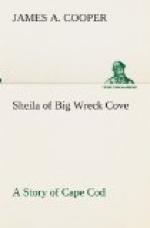He cocked the old revolver.
Suddenly the Queen of Sheba gave a snort of alarm. She looked back over her withers. The light in the cut between the sand banks was dim. Was somebody coming?
To tell the truth, Cap’n Ira had a vision of Prudence, having missed him, getting out of her bed and traveling down through the lots after him and the old mare. The idea shook him to his marrow, or was it the weight of the heavy weapon that made his hand so unsteady?
“I swan!” His oft-repeated ejaculation was almost a prayer.
At the moment he felt the sand giving under his feet. The old mare uttered again her terrified snort. He saw dimly the path behind them moving—a swift, serpentlike slide. Heavy as the mare was, she felt the landslip, too.
Cap’n Ira was not a man who easily lost his self-possession. He had been through too much to show the white flag when danger menaced. He realized that peril threatened now.
He turned squarely about and, cocked pistol in one hand and huge-knobbed cane in the other, he started away from the spot at a cripple’s gallop. The whole trough of the gully of sand seemed to be in motion. Behind him the old mare scrambled and whistled with fear, quite as unable to keep her feet as was the captain.
For, before he had gone far, Cap’n Ira found himself seated on the moving plane of sand. He glanced fearfully behind him. The Queen of Sheba was seated on her tail, her forefeet braced against nothing more stable than the avalanche itself, and she was sailing down the slope behind him like a winged Pegasus!
“My soul and body!” ejaculated Cap’n Ira. “We’re certainly on our way.”
CHAPTER IV
AT THE LATHAM HOUSE
The Latham house stood in the middle of the shallow valley behind Wreckers’ Head. The fields surrounding it were arable and well kept. The house was not as old as the Ball house and was of an entirely different style of architecture. Whereas the Ball house was low-roofed and sprawling, squatting like a huge and ugly toad on the gale-swept Head, the house Tunis Latham’s grandfather had built was three-story, including the mansard roof, painted a tobacco brown, and it was surrounded by wry-limbed cedars which could grow here because they were sheltered from the gales.
It was a gloomy-looking house even in midsummer, standing like a grim figure menaced by the tortured limbs of the trees surrounding it, stark and alone. No other human habitation was in view from its site. The Latham who had built the twelve-room house had built on hope. He desired and expected to fill the great house with a breed of Lathams that would do honor to the Cape on sea and on land. But his young wife had died the next year, after giving birth to her second child.
Tunis Latham’s father, Randall Latham, had been the elder Latham’s sole hope of perpetuating the family name and filling the big, ugly brown house behind Wreckers’ Head with tow-headed little Lathams, for the other child was a girl.




